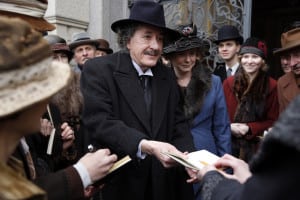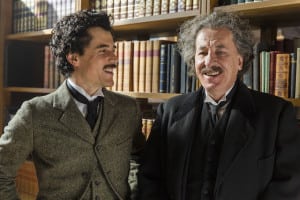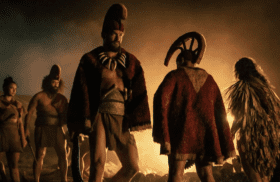 Genius marks “a true turning point” in the rebranding of National Geographic, says Carolyn Bernstein, EVP, Head of Global Scripted Development and Production, an example of the bold and ambitions storytelling that is helping the network go…Further.
Genius marks “a true turning point” in the rebranding of National Geographic, says Carolyn Bernstein, EVP, Head of Global Scripted Development and Production, an example of the bold and ambitions storytelling that is helping the network go…Further.
Cynopsis: How would you describe the network’s rebranding?
Carolyn Bernstein: As part of the rebrand in the fall, we adopted a tagline that serves as our north star – Further. “Further” embodies a relentless pursuit to go deeper. One of the ways we are doing that is with our creatively ambitious programming slate, especially on the scripted side. Our goal is to make National Geographic the No. 1 destination for premium science, adventure and exploration content. The cornerstone of our scripted programming strategy is to work with the best creative minds in the industry to deliver the authenticity that is inherent to the National Geographic brand. We want our fact-based scripted storytelling to reflect the complexity, unpredictability and entertainment value inherent in the best scripted drama.
Cynopsis: What has the response been?
Bernstein: With our new direction clearly articulated to the industry, we have had great success at attracting best-in-class creative. People in the creative community have real affection for the Nat Geo brand. All of the incredible talent with whom we are working are excited to connect with our audience through creatively bold and ambitious storytelling.
Cynopsis: How did the idea for Genius (airing Tuesdays at 9p) come about, and how does it fit into the new strategy?
Bernstein: The idea for Genius came to us from our friends at Imagin Entertainment — Ron Howard, Brian Grazer and Francie Calfo. Gigi Pritzker from OddLot Entertainment had purchased Walter Isaacson’s biography on Albert Einstein with the intent of developing it as a feature film. But there was so much rich content, she could not figure out how to capture all of it in a movie. She brought Imagine the concept as a 10-hour miniseries, and they really took to the idea of telling Einstein’s fascinating personal and professional story across 10 hours versus a two-hour feature film. There was so much complexity to his life experience. This series was an opportunity to feature Einstein as a human being – to understand his personal and professional challenges and the relationships that influenced his life.
We loved the first episode that Noah Pink wrote and were thrilled by the possibility of Ron coming on board to direct. The idea of showing how an impudent, unorthodox young Albert became iconic scientist and celebrity Einstein felt perfectly on-brand. Ron directing Geoffrey Rush as Einstein felt like the kind of elevated, ambitious creative approach that would help us establish our new premium strategy right out of the gate and mark a true turning point in the transformation of our network.
Cynopsis: How is the story relevant to today?
Bernstein: It turns out the story is incredibly relevant, which we didn’t anticipate when we first went into production. It’s about the rise of nationalism and anti-Semitism in Nazi Germany, the anti-immigration sentiment in the U.S., and the challenges Einstein’s first wife, Mileva, faced while trying to succeed as a scientist in a male-dominated profession that is hostile to women. All of these themes are unfortunately both timely and topical.
Cynopsis: What does the show reveal about Einstein that might come as a surprise to the audience?
Bernstein: Genius humanizes the man behind the mind. It took a lot of courage and perseverance on Einstein’s part to challenge the scientific establishment. He faced emotional risks, professional risks and sometimes found himself in actual physical jeopardy in order to feed his unrelenting curiosity and solve mysteries that would ultimately benefit the world. While people think they know Einstein’s story, there’s a lot that will come as a surprise. For instance, he was a ladies’ man who didn’t believe in monogamy and had an open marriage with his second wife, Elsa. His first wife, Mileva, was a brilliant mathematician and scientist who has been mostly forgotten by history. Einstein was almost prevented from immigrating to the U.S. because J. Edgar Hoover thought he was a communist. The list goes on and on, and I think viewers will be captivated by Einstein’s fascinating life.
Cynopsis: How is it different from other TV offerings?
Bernstein: I think it has the same kind of visually arresting production values and premium creative ambitions as the best cable drama. But because it’s on Nat Geo, in addition to the brilliant character drama, the audience will walk away with an understanding of Einstein’s most important and groundbreaking scientific achievements. We are bringing authenticity to his story, but we are doing it in an immersive, entertaining and visually powerful way. It’s compelling, entertaining drama with a purpose.
The Cynsiders column is a platform for industry leaders to reach out to colleagues, followers, and the public at large. In their own words and in targeted Q&As, columnists address breaking news, issues of the day, and the larger changes going on in the ever-evolving world of television, video and digital. Cynsiders columns live on Cynopsis’ main page and are promoted across all daily newsletters. We welcome readers’ comments, queries, and column ideas at [email protected].









